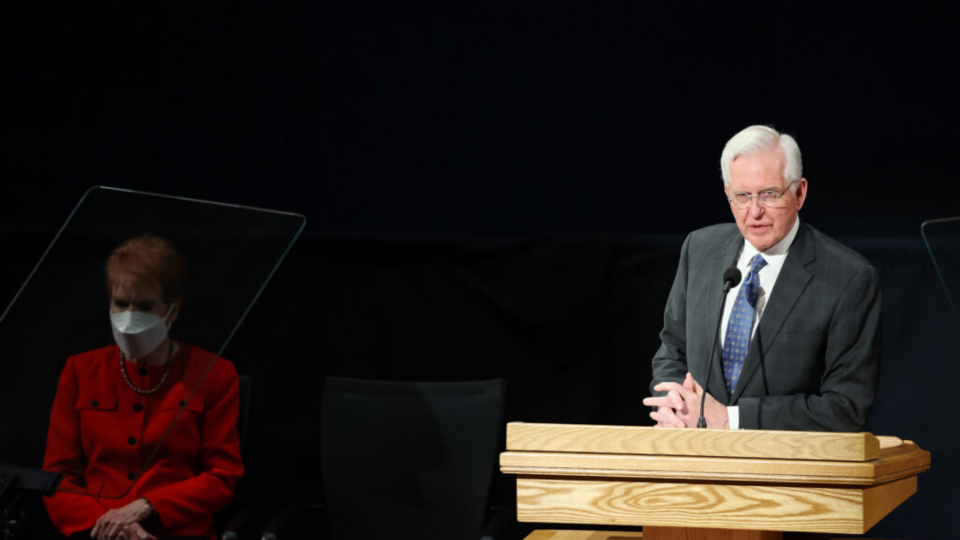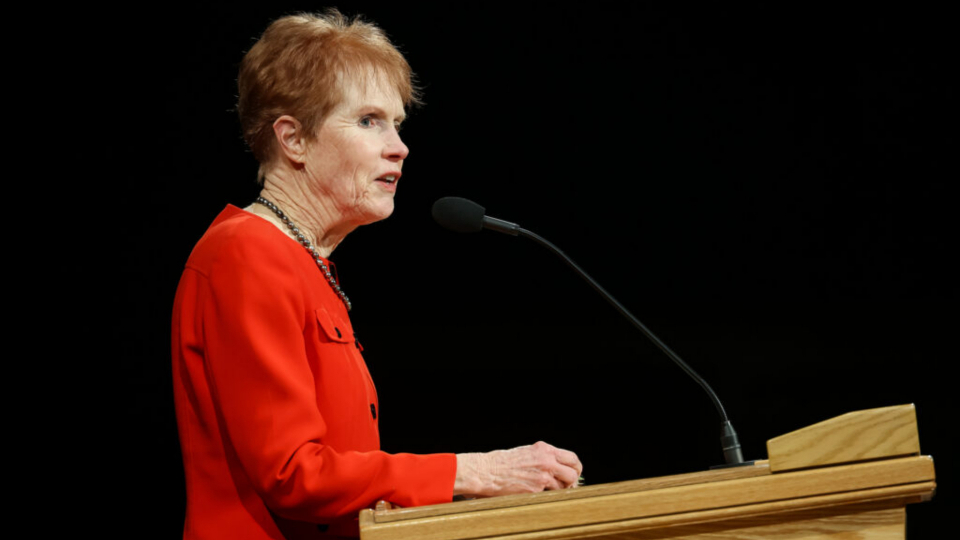- Christofferson-MTC-Devo
- Christofferson-MTC-Devo
- Christofferson-MTC-Devo
- Christofferson-MTC-Devo
- Christofferson-MTC-Devo
- Christofferson-MTC-Devo
- Christofferson-MTC-Devo
- Christofferson-MTC-Devo
- Christofferson-MTC-Devo
- Christofferson-MTC-Devo
- Christofferson-MTC-Devo
| Temple Square is always beautiful in the springtime. Gardeners work to prepare the ground for General Conference. © 2012 Intellectual Reserve, Inc. All rights reserved. | 1 / 2 |
This story appears here courtesy of TheChurchNews.com. It is not for use by other media.
By Mary Richards, Church News
PROVO, Utah
Missionaries are the Lord’s authorized messengers whose work is a magnificent expression of His redeeming love, said Elder D. Todd Christofferson of the Quorum of the Twelve Apostles.
“The greatest service we can provide to others in this life, beginning with those of our own family, is to bring them to Christ through faith and repentance so that they may experience His redemption,” said Elder Christofferson. “It will mean peace and joy now and eternal life in the world to come.”
Speaking at the Provo Missionary Training Center devotional Tuesday night, February 8, in Provo, Utah, the Apostle told the missionaries they offer the “incomparable blessings” of repentance, baptism and the gift of the Holy Ghost, opening the way to forgiveness and redemption.
Examples of Redemption
The word redeem means to pay off an obligation or a debt, explained Elder Christofferson. He shared how immigrants in the 18th and early 19th centuries sometimes entered a contract, called an indenture, in which they promised to work in America for a certain period of time as payment for their passage. They were called “redemptioners,” meaning they had to redeem the cost of their passage, or purchase their freedom by their labor.
“Redeem can also mean to rescue or set free as by paying a ransom,” he said. “If someone commits a mistake and then corrects it or makes amends, we say he has redeemed himself. Each of these meanings suggests different facets of the great redemption accomplished by Jesus Christ through His Atonement, which includes, in the words of the dictionary, ‘to deliver from sin and its penalties, as by a sacrifice made for the sinner.’”
Elder Christofferson shared the story of John Newton, the Englishman who lived from 1725 to 1807 and wrote the hymn “Amazing Grace.” Newton’s story is one of redemption and repentance — after a perilous experience at sea, he changed from a life of debauchery and immorality to eventually become a priest in the Church of England who helped abolish the slave trade in the British Empire.
The themes of “Amazing Grace” and other hymns that Newton wrote include faith, grace and the joy he found in his faith.

Christofferson-MTC-Devo
Missionaries attend a devotional at the Missionary Training Center in Provo featuring Elder D. Todd Christofferson of the Quorum of the Twelve Apostles on Tuesday, February 8, 2022. Photo by Spenser Heaps, courtesy of Church NewsCopyright 2022 Deseret News Publishing Company.
“The message of repentance and redemption as missionaries is indeed a message of joy,” said Elder Christofferson. “It is the good news of the gospel of Jesus Christ. We proclaim and testify that sins and mistakes need not be fatal or final. The Redeemer has provided a way out of darkness and the suffering and despair of sin.”
Another example of redemption is Alma the Younger in the Book of Mormon. Alma was trying to stop the church of God until he was stopped by an angel. He “went from being one of the ‘very vilest of sinners’ to one of the godliest men and powerful prophets in the history of the world,” Elder Christofferson said.
He said Alma’s case is unusual because it happened in such an intense way and in a concentrated time frame — Alma suffered for three days and three nights, until he remembered the Redeemer and called upon Him.
“For you and me and the people you teach, the process of repentance and forgiveness of sins generally occurs over time, but it is just as real and just as valid as Alma’s experience. And it need not be a long time for any of us,” said Elder Christofferson. “It is a question of how soon and how fervently we will turn our hearts and ourselves to Jesus Christ. How long will you hold back?”

Christofferson-MTC-Devo
Elder D. Todd Christofferson of the Quorum of the Twelve Apostles of The Church of Jesus Christ of Latter-day Saints speaks at a devotional at the Missionary Training Center in Provo on Tuesday, February 8, 2022. Photo by Spenser Heaps, courtesy of Church News. Copyright 2022 Deseret News Publishing Company.
Redemption After Repentance and Baptism
Elder Christofferson said the first aspect of the Savior’s redemption is that it atones for Adam’s transgression and the fall of man by overcoming physical death and spiritual death. The second aspect is redemption of one’s own sins as opposed to Adam’s transgression.
“Because we are accountable and we make the choices, the redemption from our own sins is conditional — conditioned on confessing and abandoning sin and turning to a godly life, or in other words, conditioned on repentance.”
The Atonement sanctifies and makes holy. Finally, it heals and compensates for any suffering that people innocently endure.
Elder Christofferson said this is the work of missionaries — bringing others to Christ so that they may experience His redemption through faith and repentance. Missionaries cannot redeem anyone, nor can the prophet or any mortal being.
“Therefore, you teach and testify of Jesus Christ and His Atonement so that people will gain sufficient faith in Christ that the Holy Spirit can inspire and motivate them to repent. Then in your lessons, you can help them along the path of repentance all the way to baptism.”

Christofferson-MTC-Devo
Missionaries attend a devotional at the Missionary Training Center in Provo featuring Elder D. Todd Christofferson of the Quorum of the Twelve Apostles on Tuesday, February 8, 2022. Photo by Spenser Heaps, courtesy of Church News.Copyright 2022 Deseret News Publishing Company.
He told the missionaries that many of the steps needed on the path of repentance are common for everyone, but the sequence and timing of these steps may be different for different people: “Ask yourself, ‘What is the next step this person needs to take to advance on his or her path of repentance toward baptism?’” he said. Then through prayer and the inspiration of the Holy Ghost, missionaries will be able to prepare specific messages to help those they are teaching, and guide them on a personal path of repentance.
He explained that baptism is the step that completes the repentance process. It also manifests a covenant to obey God. “Baptism is thus the ultimate step in confessing and forsaking sin (Doctrine and Covenants 58:43) — the commitment to sin no more. If we do sin again, then we repent again, and that baptismal covenant is renewed and reinvigorated, and we receive a remission of sins again,” said Elder Christofferson.
“Whatever the cost of repentance, it is swallowed up in the joy of forgiveness. Says the Lord: ‘Yea, and as often as my people repent will I forgive them their trespasses against me’ (Mosiah 26:30). ‘Behold, he who has repented of his sins, the same is forgiven, and I, the Lord, remember them no more’(Doctrine and Covenants 58:42).”
Jesus Christ at the Center
“Keep Jesus Christ at the center of your mission and your life,” Elder Christofferson told the missionaries. “Always give Him the praise and the glory for all you are able to accomplish. Never tire of teaching about Him and His power of redemption. The testimony of Jesus is our message.”
He reiterated that without Jesus Christ and His Atonement, there is no redemption from sin and no redemption from death. Because of the Holy One of Israel, God has prepared “a way for our escape from the grasp of this awful monster; yea, that monster, death and hell” (2 Nephi 9:10).
Elder Christofferson bore a concluding testimony of Jesus Christ.
“His love is perfect, His doctrine is perfect, and His grace is infinite. He is the resurrected Lord. He is the head of The Church of Jesus Christ of Latter-day Saints,” said Elder Christofferson to the missionaries. “You are His servants. Go forth in His authority and power to preach redemption.”
A Priceless Treasure
Before Elder Christofferson’s remarks, Sister Kathy Christofferson described how she began to gain a testimony of the Book of Mormon. While in an early morning seminary class in high school, she read through the book for the first time on her own, reaching Mormon 8:34-35 and reading the words, “But behold, Jesus Christ hath shown you unto me, and I know your doing.”
“When I read those words, something happened,” she explained. “It was as if that voice was crying from the dust to me to say, ‘I have in fact seen you.’ And I knew it, and I knew it was true. And it changed everything.”

Christofferson-MTC-Devo
Sister Kathy Christofferson, wife of Elder D. Todd Christofferson of the Quorum of the Twelve Apostles of The Church of Jesus Christ of Latter-day Saints, speaks at a devotional at the Missionary Training Center in Provo on Tuesday, February 8, 2022. Photo by Spenser Heaps, courtesy of Church News. Copyright 2022 Deseret News Publishing Company.
Sister Christofferson told the missionaries that having a testimony of the Book of Mormon will always be about faith, and they must do the spiritual groundwork to receive the spiritual blessings.
“It is a priceless treasure and as we share it with the world, we are blessing their lives,” she testified.
That testimony touched the heart of Sister Avery Wight, from Gilbert, Arizona, who is training for the Spain Barcelona Mission. “Listening to Sister Christofferson share her testimony of the Book of Mormon, that’s something I want to share, too,” said Sister Wight.
She was grateful for Elder Christofferson’s message of redemption: “It’s just given me a lot of hope and motivation for my mission — preaching the word of the gospel and bringing souls to this great message. It gives me motivation to bring others that same joy that I have.”
Sister Erica Pearson, from western Washington and going to serve in the Mexico Pachuca Mission, also appreciated the message of joy described by the Apostle: “I’m super excited to get out there and help people work through the path of repentance to get to baptism and to help them find their way to happiness and learn of the gospel and spread the word.”
Elder Elijah Kauvaka, from Fresno, California, was sitting on the second row in the large room. He shared similar thoughts: “I absolutely loved how his talk was all about Christ. It made me so excited to spread the truth and the gospel of Christ with others.”
One particular part of Elder Christofferson’s message felt very personal to Elder Jonah Messinger, from Anaheim, California, bound for the Bolivia Santa Cruz mission. He said his grandfather had just passed away, and his dad told him that as he was dying, they turned on some music in the room. “My grandma’s favorite song was ‘Amazing Grace.’ We all knew my grandma had welcomed my grandpa into heaven. And Elder Christofferson sharing that song in his talk was amazing. It sent chills down my spine as soon as he said something about it.”
The devotional was broadcast to other missionary training centers around the world and put on all full-time missionaries’ online portal for viewing.
Copyright 2022 Deseret News Publishing Company.